2015仁爱英语 八年级上册Unit3topic3知识点总结
- 格式:docx
- 大小:42.74 KB
- 文档页数:12
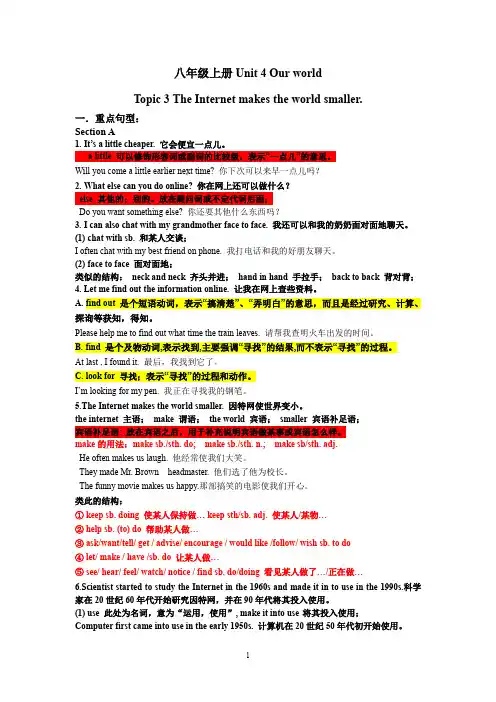
八年级上册Unit 4 Our worldTopic 3 The Internet makes the world smaller.一.重点句型:Section A1.It’s a little cheaper. 它会便宜一点儿。
a little 可以修饰形容词或副词的比较级,表示“一点儿”的意思。
Will you come a little earlier next time? 你下次可以来早一点儿吗?2.What else can you do online? 你在网上还可以做什么?else 其他的;别的。
放在疑问词或不定代词后面;Do you want something else? 你还要其他什么东西吗?3.I can also chat with my grandmother face to face. 我还可以和我的奶奶面对面地聊天。
(1)chat with sb. 和某人交谈;I often chat with my best friend on phone. 我打电话和我的好朋友聊天。
(2)face to face 面对面地;类似的结构:neck and neck 齐头并进;hand in hand 手拉手;back to back 背对背;4. Let me find out the information online. 让我在网上查些资料。
A.find out 是个短语动词,表示“搞清楚”、“弄明白”的意思,而且是经过研究、计算、探询等获知,得知。
Please help me to find out what time the train leaves. 请帮我查明火车出发的时间。
B.find 是个及物动词,表示找到,主要强调“寻找”的结果,而不表示“寻找”的过程。
At last , I found it. 最后,我找到它了。
C.look for 寻找;表示“寻找”的过程和动作。
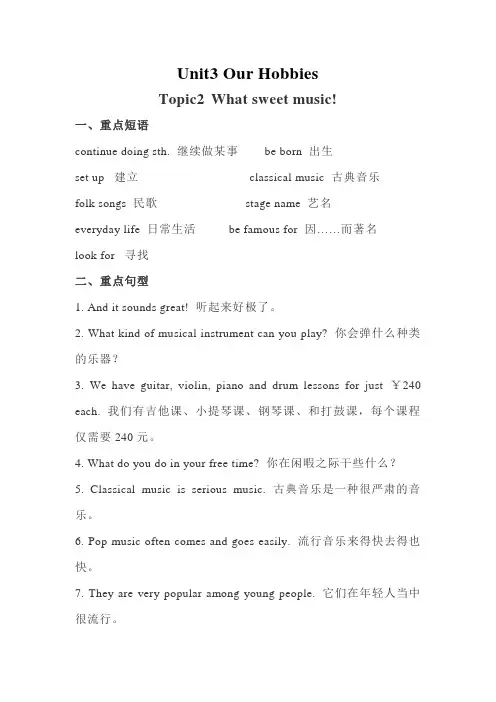
Unit3 Our HobbiesTopic2 What sweet music!一、重点短语continue doing sth. 继续做某事 be born 出生set up 建立classical music 古典音乐folk songs 民歌stage name 艺名everyday life 日常生活be famous for 因……而著名look for 寻找二、重点句型1. And it sounds great! 听起来好极了。
2. What kind of musical instrument can you play? 你会弹什么种类的乐器?3. We have guitar, violin, piano and drum lessons for just ¥240 each. 我们有吉他课、小提琴课、钢琴课、和打鼓课,每个课程仅需要240元。
4. What do you do in your free time? 你在闲暇之际干些什么?5. Classical music is serious music. 古典音乐是一种很严肃的音乐。
6. Pop music often comes and goes easily. 流行音乐来得快去得也快。
7. They are very popular among young people. 它们在年轻人当中很流行。
8. Guo Lanying, Song Zuying and Tenger are famous for their folk songs. 郭兰英,宋祖英和腾格尔以(唱)民歌而出名。
9. It is one of the most famous rock bands in the world. 它是世界上最著名的摇滚乐队之一。
10. In the fall of 1976, a 14-year-old high school student, Larry Mullen, looked for some musicians. 在1976年的秋天,一个14岁的中学生,Larry Mullen寻找一些音乐家。
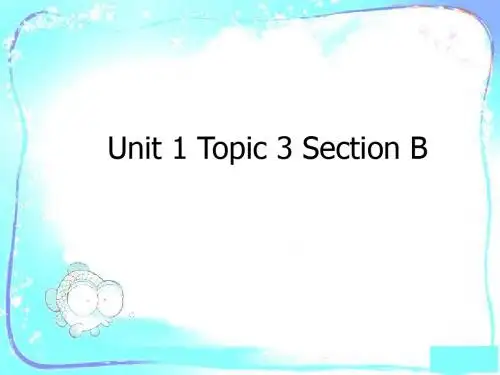
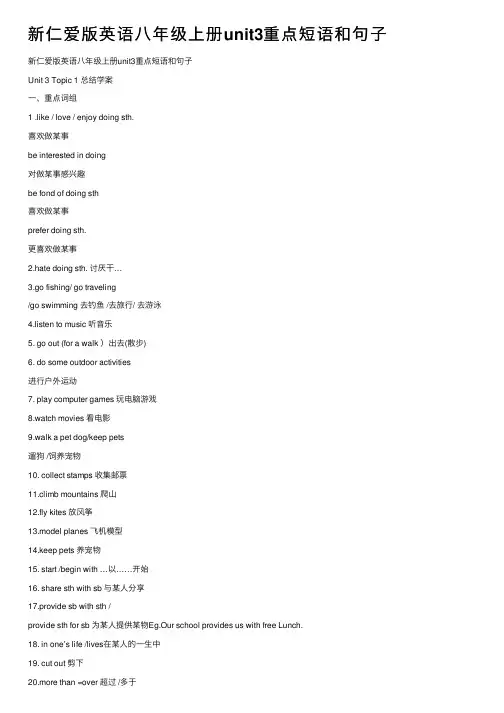
新仁爱版英语⼋年级上册unit3重点短语和句⼦新仁爱版英语⼋年级上册unit3重点短语和句⼦Unit 3 Topic 1 总结学案⼀、重点词组1 .like / love / enjoy doing sth.喜欢做某事be interested in doing对做某事感兴趣be fond of doing sth喜欢做某事prefer doing sth.更喜欢做某事2.hate doing sth. 讨厌⼲…3.go fishing/ go traveling/go swimming 去钓鱼 /去旅⾏/ 去游泳4.listen to music 听⾳乐5. go out (for a walk )出去(散步)6. do some outdoor activities进⾏户外运动7. play computer games 玩电脑游戏8.watch movies 看电影9.walk a pet dog/keep pets遛狗 /饲养宠物10. collect stamps 收集邮票11.climb mountains 爬⼭12.fly kites 放风筝13.model planes 飞机模型14.keep pets 养宠物15. start /begin with …以……开始16. share sth with sb 与某⼈分享17.provide sb with sth /provide sth for sb 为某⼈提供某物Eg.Our school provides us with free Lunch.18. in one’s life /lives在某⼈的⼀⽣中19. cut out 剪下20.more than =over 超过 /多于21.take a bath 淋浴22.take sb/sth out for a walk带某⼈/某物出去散步23.be special to sb对某⼈来说是特殊的24. go to the movie theater去电影院25.in one’s free time在某⼈的业余时间26.dance to music 伴着⾳乐跳舞27. Not all 并⾮所有28.call sb. sth. 把某某称之为….29. just like 就像…30.learn…from 从…学到31. learn /know about 了解32. talk about 谈论33.sounds good 听起来很好34.stick ...to ...粘贴到…/doc/5115011201.htmled to do sth . 过去常常⼲…否定: didn’t use to do sth. ⼀般疑问句:Did sb use to do sth ?①.I used to collect stamps, but now I hate it.②. He didn’t use to play computer games , but now he likes it.③. What hobby did you use to have?=Our school provides free lunch for us.⼆、重点句⼦1.What do you do in your free time ?在空闲时间⾥你做什么?2.What’s your habby?你的爱好是什么?3.Why not go out and do some outdoor activities?为什么不出去做户外活动?4.Kangkang is fond of swimming 康康喜欢游泳5.I used to enjoy pop music ,but now I don’t like it。
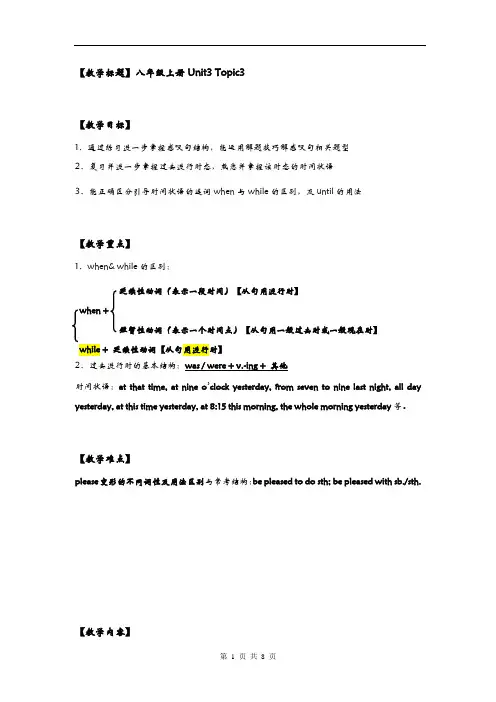
【教学标题】八年级上册Unit3 Topic3【教学目标】1、通过练习进一步掌握感叹句结构,能运用解题技巧解感叹句相关题型2、复习并进一步掌握过去进行时态,熟悉并掌握该时态的时间状语3、能正确区分引导时间状语的连词when与while的区别,及until的用法【教学重点】1、when& while的区别:延续性动词(表示一段时间)【从句用进行时】when +短暂性动词(表示一个时间点)【从句用一般过去时或一般现在时】while + 延续性动词【从句用进行时】2、过去进行时的基本结构:was / were + v.-ing + 其他时间状语:at that time, at nine o’clock yesterday, from seven to nine last night, all day yesterday, at this time yesterday, at 8:15 this morning, the whole morning yesterday等。
【教学难点】please变形的不同词性及用法区别与常考结构:be pleased to do sth; be pleased with sb./sth. 【教学内容】※考点 1 when & while、until原文重现:The telephone rings while Jane is practicing the violin.On the plane from New York, Jim was playing computer games until they served the food.1.1 此处while = when 意为“当……的时候”,引导时间状语从句。
when 与while 区别延续性动词(表示一段时间)【从句用进行时】when +短暂性动词(表示一个时间点)【从句用一般过去时或一般现在时】延续性动词【从句用进行时】Eg. While / When I was having supper, someone knocked at the door.When you leave the room, please turn off the lights.1.2until “直至;直到”(主句用延续性动词)not ... until ... “到……时候才”(主句用短暂性动词)【过手练习】1. Tom was watching TV _______ his father came back.A. whileB. asC. whenD. and2. Now many young people _______ go to bed _______ ten o'clock every night.A. don't; untilB. not; untilC. didn't; untilD. /; until3. Newton was playing under an apple tree _______ an apple fell onto his head.A. whenB. whileC. afterD. before※考点 2 pleasant/agree原文重现:I think classical music is pleasant.I don’t agree. I agree with you.2.1pleasant 形容词“令人愉快的,舒适的”辨别:please 动词,“请;使高兴”pleasant 形容词,作定语时,意为“令人愉快的”,一般用来修饰事物;作表语时,句子的主语一般是事物。
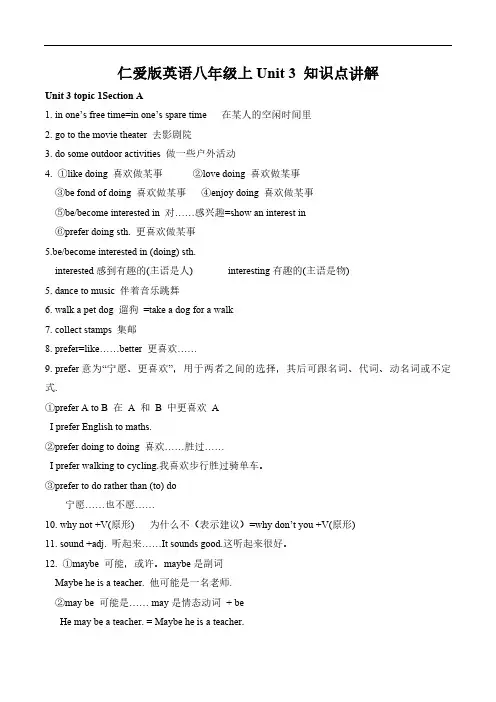
仁爱版英语八年级上Unit 3 知识点讲解Unit 3 topic 1Section A1. in one’s free time=in one’s spare time 在某人的空闲时间里2. go to the movie theater 去影剧院3. do some outdoor activities 做一些户外活动4. ①like doing 喜欢做某事②love doing 喜欢做某事③be fond of doing 喜欢做某事④enjoy doing 喜欢做某事⑤be/become interested in 对……感兴趣=show an interest in⑥prefer doing sth. 更喜欢做某事5.be/become interested in (doing) sth.interested感到有趣的(主语是人) interesting有趣的(主语是物)5. dance to music 伴着音乐跳舞6. walk a pet dog 遛狗=take a dog for a walk7. collect stamps 集邮8. prefer=like……better 更喜欢……9. prefer意为“宁愿、更喜欢”,用于两者之间的选择,其后可跟名词、代词、动名词或不定式.①prefer A to B 在 A 和 B 中更喜欢AI prefer English to maths.②prefer doing to doing 喜欢……胜过……I prefer walking to cycling.我喜欢步行胜过骑单车。
③prefer to do rather than (to) do宁愿……也不愿……10. why not +V(原形) 为什么不(表示建议)=why don’t you +V(原形)11. sound +adj. 听起来……It sounds good.这听起来很好。
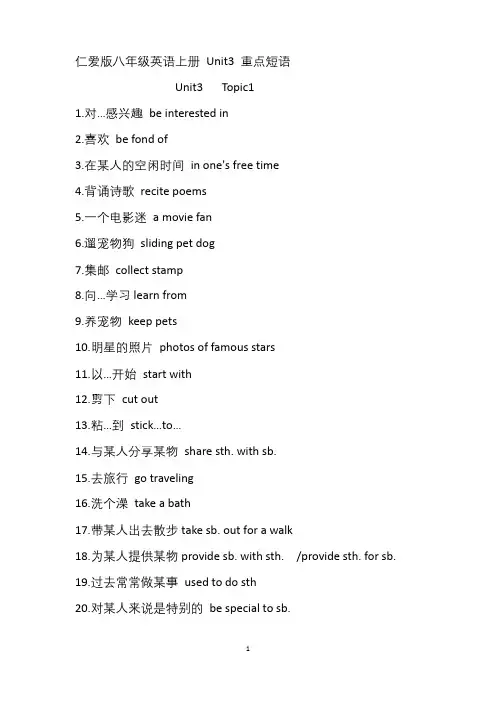
仁爱版八年级英语上册Unit3 重点短语Unit3 Topic11.对…感兴趣be interested in2.喜欢be fond of3.在某人的空闲时间in one's free time4.背诵诗歌recite poems5.一个电影迷a movie fan6.遛宠物狗sliding pet dog7.集邮collect stamp8.向…学习learn from9.养宠物keep pets10.明星的照片photos of famous stars11.以…开始start with12.剪下cut out13.粘…到stick…to…14.与某人分享某物share sth. with sb.15.去旅行go traveling16.洗个澡take a bath17.带某人出去散步take sb. out for a walk18.为某人提供某物provide sb. with sth. /provide sth. for sb.19.过去常常做某事used to do sth20.对某人来说是特别的be special to sb.Unit3 topic 21.在音乐会at the concert2.一个美妙的夜晚a wonderful evening3.看电影watch movies4.甜美音乐sweet music5.流行音乐pop music6.民俗乐folk music7.古典乐classical music8.日常生活everyday life9.出生于be born in10.在…岁时at the age of11.没有任何帮助without any help12.上音乐课take music classes13.弹钢琴play the piano14.各种各样all kinds of15.要求某人做某事ask sb to do sth16.打鼓pal the drum17.因…而出名be famous for18.讨厌做某事hate doing sth19.最喜欢… like…best20.给某人带来某物bring sb sth.Unit 3Topic 31.接电话answer the telephone2.别挂断hold the line3.做些清洁工作do some cleaning4.上菜serve the food5.和某人聊天chat with sb.6.听新闻listen to music7.聚会get together8.低声地说in a low voice9.路过pass by10.敲门knock at the door11.洗淋浴take a shower12.同意某人的看法agree with sb.13.此时此刻at this time/this time14.害怕做某事be afraid to do sthbe afraid of doing sth15.在19 世纪in the 1800s16.太…以致不能too…to…17.停止做某事stop doing sth18.停下来去做其它事stop to do sth19.一个两天的假期a two-day weekend20.忧郁星期一blue Monday仁爱版八年级英语上册Unit3重点短语默写版Unit3Topic11.对…感兴趣2.喜欢3.在某人的空闲时间4.背诵诗歌5.一个电影迷6.遛宠物狗7.集邮8.向…学习9.养宠物10.明星的照片11.以…开始12.剪下13.粘…到14.与某人分享某物15.去旅行16.洗个澡17.带某人出去散步18.为某人提供某物19.过去常常做某事20.对某人来说是特别的Unit3 topic 21.在音乐会2.一个美妙的夜晚3.看电影4.甜美音乐5.流行音乐6.民俗乐7.古典乐8.日常生活9.出生于10.在…岁时11.没有任何帮助12.上音乐课13.弹钢琴14.各种各样15.要求某人做某事16.打鼓17.因…而出名18.讨厌做某事19.最喜欢…20.给某人带来某物Unit 3Topic 3接电话2.别挂断3.做些清洁工作4.上菜5.和某人聊天6.听新闻7.聚会8.低声地说9.路过10.敲门11.洗淋浴12.同意某人的看法13.此时此刻14.害怕做某事15.在19 世纪16.太…以致不能17.停止做某事18.停下来去做其它事19.一个两天的假期20.忧郁星期一Unit3 topic 21.在音乐会2.一个美妙的夜晚3.看电影4.甜美音乐5.流行音乐6.民俗乐7.古典乐8.日常生活9.出生于10.在…岁时11.没有任何帮助12.上音乐课13.弹钢琴14.各种各样15.要求某人做某事16.打鼓17.因…而出名18.讨厌做某事19.最喜欢…20.给某人带来某物Unit 3Topic 3接电话2.别挂断3.做些清洁工作4.上菜5.和某人聊天6.听新闻7.聚会8.低声地说9.路过10.敲门11.洗淋浴12.同意某人的看法13.此时此刻14.害怕做某事15.在19 世纪16.太…以致不能17.停止做某事18.停下来去做其它事19.一个两天的假期20.忧郁星期一。
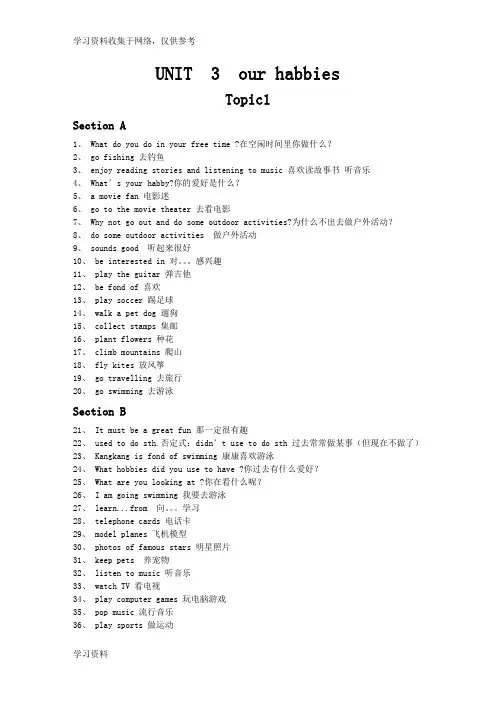
UNIT 3 our habbiesTopic1Section A1、 What do you do in your free time ?在空闲时间里你做什么?2、 go fishing 去钓鱼3、 enjoy reading stories and listening to music 喜欢读故事书听音乐4、 What’s your habby?你的爱好是什么?5、 a movie fan 电影迷6、 go to the movie theater 去看电影7、 Why not go out and do some outdoor activities?为什么不出去做户外活动?8、 do some outdoor activities 做户外活动9、 sounds good 听起来很好10、 be interested in 对。
感兴趣11、 play the guitar 弹吉他12、 be fond of 喜欢13、 play soccer 踢足球14、 walk a pet dog 遛狗15、 collect stamps 集邮16、 plant flowers 种花17、 climb mountains 爬山18、 fly kites 放风筝19、 go travelling 去旅行20、 go swimming 去游泳Section B21、 It must be a great fun 那一定很有趣22、 used to do sth.否定式:didn’t use to do sth 过去常常做某事(但现在不做了)23、 Kangkang is fond of swimming 康康喜欢游泳24、 What hobbies did you use to have ?你过去有什么爱好?25、 What are you looking at ?你在看什么呢?26、 I am going swimming 我要去游泳27、 learn...from 向。
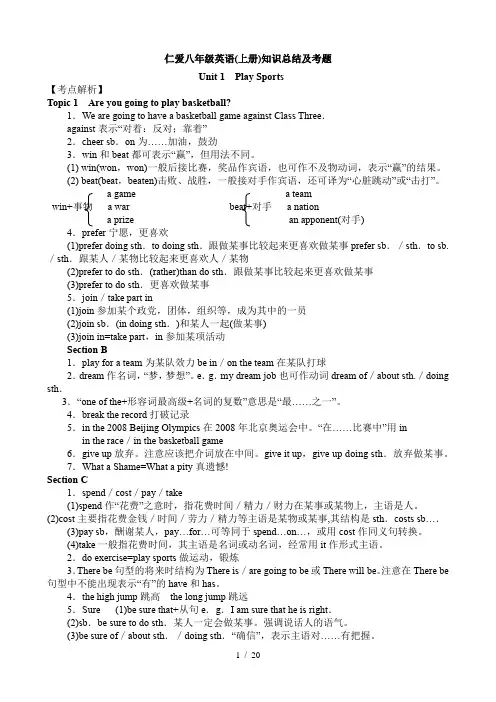
仁爱八年级英语(上册)知识总结及考题Unit 1 Play Sports【考点解析】Topic 1 Are you going to play basketball?1.We are going to have a basketball game against Class Three.against表示“对着:反对;靠着”2.cheer sb.on为……加油,鼓劲3.win和beat都可表示“赢”,但用法不同。
(1) win(won,won)一般后接比赛,奖品作宾语,也可作不及物动词,表示“赢”的结果。
(2) beat(beat,beaten)击败、战胜,一般接对手作宾语,还可译为“心脏跳动”或“击打”。
a game a teamwin+事物 a war beat+对手 a nationa prize an apponent(对手)4.prefer宁愿,更喜欢(1)prefer doing sth.to doing sth.跟做某事比较起来更喜欢做某事prefer sb./sth.to sb./sth.跟某人/某物比较起来更喜欢人/某物(2)prefer to do sth.(rather)than do sth.跟做某事比较起来更喜欢做某事(3)prefer to do sth.更喜欢做某事5.join/take part in(1)join参加某个政党,团体,组织等,成为其中的一员(2)join sb.(in doing sth.)和某人一起(做某事)(3)join in=take part,in参加某项活动Section B1.play for a team为某队效力be in/on the team在某队打球2.dream作名词,“梦,梦想”。
e.g.my dream job也可作动词dream of/about sth./doing sth.3.“one of the+形容词最高级+名词的复数”意思是“最……之一”。
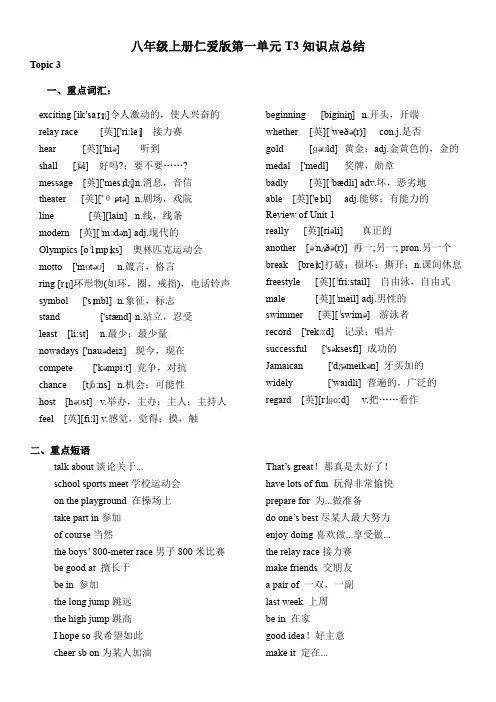
八年级上册仁爱版第一单元T3知识点总结Topic 3一、重点词汇:exciting [ik’saɪtɪŋ]令人激动的,使人兴奋的relay race [英]['ri:leɪ]接力赛hear [英]['hiə]听到shall [ʃəl] 好吗?;要不要……? message [英]['mesɪdʒ]n.消息,音信theater [英]['θɪətə]n.剧场,戏院line [英][lain]n.线,线条modern [英][ˈmɔdən] adj.现代的Olympics [oˈlɪmpɪks] 奥林匹克运动会motto ['mɒtəʊ]n.箴言,格言ring [rɪŋ]环形物(如环,圈,戒指),电话铃声symbol ['sɪmbl]n.象征,标志stand ['stænd]n.站立,忍受least [li:st]n.最少;最少量nowadays['nauədeiz]现今,现在compete ['kəmpi:t] 竞争,对抗chance [tʃɑ:ns]n.机会;可能性host[həʊst]v.举办,主办;主人;主持人feel [英][fi:l] v.感觉,觉得;摸,触beginning [biginiŋ]n.开头,开端whether [英][ˈweðə(r)]con.j.是否gold [ɡəʊld]黄金;adj.金黄色的,金的medal ['medl]奖牌,勋章badly [英][ˈbædli] adv.坏,恶劣地able [英]['eɪbl]adj.能够;有能力的Review of Unit 1really [英][riəli]真正的another [əˈnʌðə(r)] 再一;另一; pron.另一个break [breɪk]打破;损坏;撕开;n.课间休息freestyle [英][ˈfri:stail] 自由泳,自由式male [英][ˈmeil]adj.男性的swimmer [英][ˈswimə]游泳者record ['rekɔ:d]记录;唱片successful ['səksesfl] 成功的Jamaican ['dʒəmeikən] 牙买加的widely ['waidli]普遍的,广泛的regard [英][rɪ'ɡɑ:d]v.把……看作二、重点短语talk about谈论关于...school sports meet学校运动会on the playground 在操场上take part in参加of course当然the boys’ 800-meter race男子800米比赛be good at 擅长于be in 参加the long jump跳远the high jump跳高I hope so我希望如此cheer sb on为某人加油That’s great!那真是太好了!have lots of fun 玩得非常愉快prepare for 为...做准备do one’s best尽某人最大努力enjoy doing喜欢做...享受做... the relay race接力赛make friends 交朋友a pair of 一双,一副last week 上周be in 在家good idea!好主意make it 定在...see you 再见find out发现a symbol of...的象征stand for代表at least至少be held by被...举办every four years每四年一次in turn轮流,依次all over the world在全世界in the future 将来become more and more popular变得越来越流行have the chance to do 有机会做... the Olympic Games奥运会win first place赢得第一名be sorry that很遗憾...do badly in在...表现不好next time下一次finish line终点线do more exercise做更多锻炼be able to do能够做...teach sb sth=teach sth to sb教某人... be regarded as 被认为...,被当做... break the world record 打破世界记录三、课文重要知识点Section A1.The school sports meet is coming。
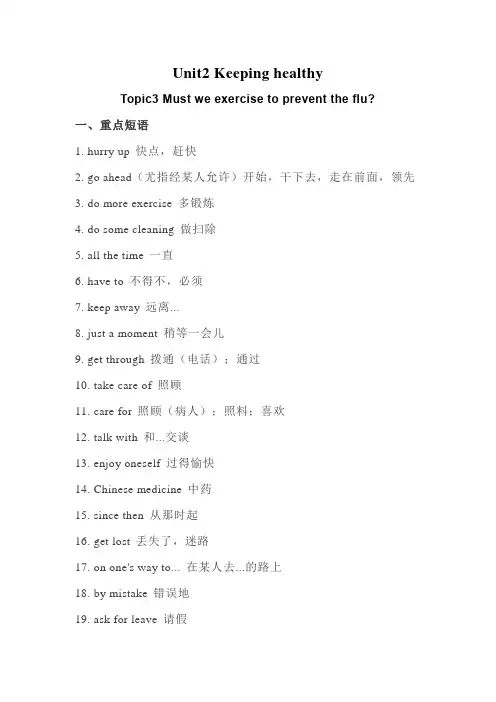
Unit2 Keeping healthyTopic3 Must we exercise to prevent the flu?一、重点短语1. hurry up 快点,赶快2. go ahead(尤指经某人允许)开始,干下去,走在前面,领先3. do more exercise 多锻炼4. do some cleaning 做扫除5. all the time 一直6. have to 不得不,必须7. keep away 远离...8. just a moment 稍等一会儿9. get through 拨通(电话);通过10. take care of 照顾11. care for 照顾(病人);照料;喜欢12. talk with 和...交谈13. enjoy oneself 过得愉快14. Chinese medicine 中药15. since then 从那时起16. get lost 丢失了,迷路17. on one's way to... 在某人去...的路上18. by mistake 错误地19. ask for leave 请假20. healthy food 健康食物21. crowded places 拥挤的地方22. do one`s best 尽力23. change clothes often 常换衣服24. wash hands often 常洗手25. ring...up 打电话给...26. leave a message 留口信27. take a message 带口信28. call...back 给...回电话29. take an active part in 积极参加30. the name of... ...的名称31. what do you think of...? 你认为...怎么样?32. have a good time=enjoy oneself 过得愉快33. next time 下次34. let...out 让...出去35. teach oneself on the Internet 网上自学36. be afraid of 害怕...,恐惧...二、重点句型Section A1. Mom, hurry up ! Dad is on TV.①hurry up 赶快,表催促②hurry to do sth. = do sth. in a hurry 匆忙地做某事He hurried to finish the work. = Hefinished the work in a hurry.③ hurry to+某地:表匆匆地去某地,如:He hurried to the hospital.= He went to the hospital in a hurry. (2) be on TV 某人或某事物上电视。
Unit 3 our hobbiesTopic 3 what were you doing at this time yesterday?Section A一.重点词汇1.hold the line 请等一会儿2. answer the telephone 接电话3.practice(doing)sth 练习(做)某事4.at this time yesterday 昨天的这个时候5.call sb to do sth 打电话叫某人做某事6.the English corner 英语角7.take a shower 洗淋浴 8.ash clothes洗衣服9.do some cleaning 打扫卫生 10.from...to 从...到...10.11.Pass the time消磨时光 12.chat with sb 和某人聊天13.listen to the news听新闻 14.visit a museum 参观博物馆15.roast duck 烤鸭二.重点句型:1. The telephone rings while Jane is practice the violin.2.Hold the line, please.3.What were you doing at this time yesterday?4.I called you to go to the English Corner but no one answered.三.课本知识点讲解1.Hold the line 相当于hold on, wait a moment, just a moment2.at this time yesterday “昨天的这个时候”,当它作时间状语的时候,句子用过去进行时。
Kate ___________(plant) trees in the park at this time yesterday.3.call sb to do sth 叫/打电话叫某人做某事e.g. Please call him to come here tomorrow.Would you like to call Marry _________ (see) the animals in the zoo?4.answer the phone 接电话answer的意思是“回答,答复”。
如:1) What shall I answer?我将怎样回答呢?2) Have you answered his letter? 你回了他的信吗?3) Answer the door, please, Jack. Someone is knocking at the door.开门去,杰克,有人在敲门。
—What did Allen say just now?—Sorry , I don’t know. I was ________ (接) the phone.5.No one=nobody 为不定代词意思为没人,在词句中做主语。
常用的不定代词有:nobody,somebody,anybody,everybody等。
6.practice (doing) sth 练习做某事Does your father practice _______ (play) the piano every day?We practiced_______ (唱) English songs for one hour a day.考题链接:We’re going to practice_____ English as much as possible.A.speak B.to speak C.speaking D.speak about7.Oh, I was taking a shower. 我在淋浴。
take a shower淋浴,也可以用动词have代替take。
如:洗澡 take a bath/have a bath休息一下take a rest /have a rest看一看take a look/ have a look散散步take a walk /have a walk( )My father usually________ a shower _________the morning.A.take; inB. takes; inC. take; onD. takes; at8.Yeah, I don’t think so.是,我也这样认为。
在think后面可以用so来代替前面的内容,以避免重复。
例如:— Is he at home? 他在家吗?— Yes, I think so. 是的,我想他在家。
I think so.的否定形式一般为I don’t think so.例如:—Do you think classical music is very popular in China?你认为古典音乐在中国很流行吗?—No, I don’t think so. 不,我认为不很流行。
类似否定前移用法的词语有:suppose, believe, imagine, guessI didn’t suppose they would be back tonight.我认为他们今晚不会回来了。
I don’t believe that anybody can do better than you.我认为没有人可以做得比你更好。
Section B-D一.重点词汇agree- agreement- disagreement pleasant 令人愉快的 8.brave 勇敢的1.watch a movie 看电影st week 上周3.I don’t think so 我不这么认为4.just so-so 一般般/马马虎虎5.agree with sb 同意某人6.know about..了解7.quite right 非常正确二.课本知识点讲解1.pleasant 形容词 (物) 使人感到高兴的;e.g. a pleasant day译:_______________________________pleased 形容词, (人) 对...感到高兴的;e.g. They will be pleased to hear it. 译_____________________________________ pleasure,名词意为“快乐”e.g.Watching sports gave him great pleasure. 译_____________________________be pleased with 意为“对......感到满意”We will never forget the ________ (please) trip to Mount Huang last year.We are _______ with the ________ holiday.(pleased ,pleasant)Our teacher _______ _______ ________ (对......满意) what we did.It’s my_______(pleasure, pleased ,pleasant).(不用谢,这是我的荣幸)2.Isn’t it interesting ?“难道它不有趣吗?”这是一个否定疑问句。
注意回答与事实相符用Yes,it is.“不,它很有趣”,与事实不符用No ,it isn’t .“是的,不好看。
”--Weren’t you late for school yesterday?--__________.Because it rained heavily.A.Yes,I was.B. No, I was.C. No, I wasn,tD. Yes,I wasn’t.3.agree 的用法agree with sb 同意某人的观点,看法 agree to do sth 同意做某事练习: 1.Do you agree _____me ,Bob ?(on, with)2.--Harry Potter is a brave man.-- I ____ _____(同意) you.3.My father agreed______________ (buy) me a cell phone on my birthday.他同意马上离开。
______________________________________同意别人的观点,我们可以说Yes,I think so /I agree with you.表示不同意别人的观点,我们可以说No,I don’t think so /I don’t agree with you.( ) ---We shouldn’t spend much time on computer games.It’s bad for our eyes. ---____________!A.I agree with you .B.I hope not .C. I’m sorry to hear that.Section C一.重点词汇1.on a new year’s EVE 在除夕夜2.get together 团聚3.a poor little girl 一个可怜的小女孩4.walk in the street 走在街上5.cry in a low voice 低声喊着6.pass by 经过/路过7.blow strongly 猛烈地吹 8.fall down 落下/掉下/跌倒9.be afraid to do sth 害怕做某事 10.beat sb 打某人,战胜某人10.a burning match 一根点燃的蜡烛 11.warm sb up 热身,使...变暖和12.go out熄灭 13.against the wall 靠着墙14.knock at 敲 e out 出来,出现 16. wake up 醒来17.chat with sb 与某人聊天二.课本知识点讲解1.介词in, on, at在表示时间时的用法区别①in时间范围大(一天以上)表示在某个世纪,某年,某月,某个季节以及早晨,下午,晚上如:in Tanuary, in winter, in 1999;泛指在上午,下午,晚上,如:in the morning(afternoon, evening).习惯用法:in the daytime 在白天。
②on表示具体的某一天,和某一天的上午,下午,晚上时,如:on Monday, on Sunday afternoon, on July 1, 1999③at时间最短,一般表示点时间,如at six o’clock, at three thirty.习惯用法:at night, at noon, at this time of year.用in ,on ,at 填空:_______ seven , _______the evening, _______ noon, _______2008, _______Sunday afternoon, _______July,_______a cold morning, _______the morning of the new year,_______ the 1990s,______ spring,_____ the 1st of October, _______ Sunday考题链接:()I often get up ___ 8:00 ____ Sunday _____ April.A.at,on,inB.at,in,onC.on,in,at()They arrived _____ London_____ a cold winter night.A.in, onB. at, onC. at, in()___ the morning of June 25, they visited the factory.In B. On C. At D. From2.beat sb 打某人,打败某人你不应该打这孩子。